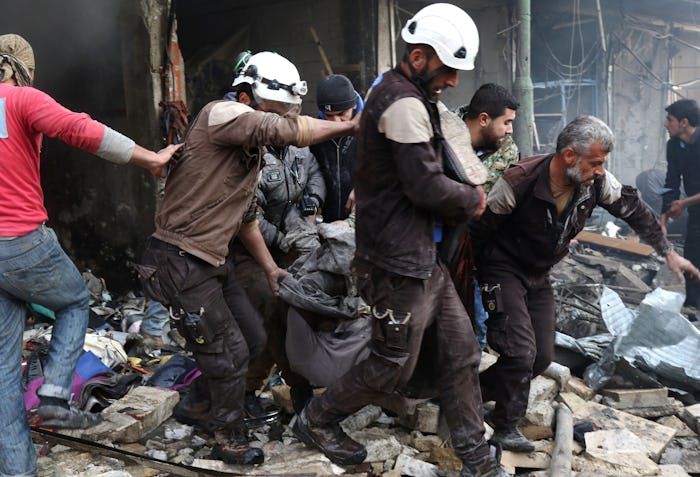News

Who Are The White Helmets? The Syrian Rescue Organization Rescues People From Rubble
The civil war in rebel-held Syria is so deadly and grim that just when it seems like the news updates couldn't possibly get worse, they do. Images of death and destruction are constant, and stories about the bombing of children's hospitals and chemical gas attacks on civilians are hard to even comprehend. But despite the awful, heartbreaking reality of their day-to-day lives, many who remain in the area have dedicated themselves to trying to help however they can. Who are the White Helmets? The 3,000 volunteers who make up the Syrian Civil Defense, have been spending the past six years carrying out search-and-rescue efforts aimed at saving as many lives as they can following airstrikes and bombings. And the result has been significant: according to The Atlantic, it's been estimated that the group has managed to save more than 60,000 people.
And yet, the danger these volunteers face is staggering. The organization's website explains that in some rebel-held Syrian neighborhoods, "more than 50 bombs and mortars" land each day, many of which are "rusty barrels filled with nails and explosives, rolled out the back of government helicopters" in civilian areas. And when those bombs hit, the White Helmets begin the search for survivors — even though, according to The Economist, that puts them in danger of being hurt or killed if Russian or Syrian forces opt to strike again. And they do: approximately one in six White Helmet volunteers has been killed or badly wounded this way.
So why do they do it? Literally to save lives, and to do something — anything — to fight back against the government forces that have basically reduced their cities to rubble. As the bombings intensified in Syria, those who survived came out to help find those who were still trapped, and to help collect the bodies of those who died. Small groups of volunteers started to come together, according to The Economist, just trying to figure their way out as they went along, but in 2013, the effort became formalized, when the White Helmets began to receive training and financial support from the U.K. and the United States — the group now receives millions of dollars in funding, for training and equipment, according to The Atlantic.
The White Helmets emphasize that they are "unarmed and neutral" in the conflict, and that their goal is to save anyone who needs saving, regardless of which side they are on. And while their original purpose was just to try locate bodies following bombings and airstrikes, the White Helmets now also focus on delivering public services, like "reconnecting electrical cables, providing safety information to children and securing buildings." The 78 female volunteers who have joined the White Helmets also provide an important opportunity to help in the most conservative communities, where help from male volunteers has been refused for women and girls due to religious beliefs. The women of the White Helmets are able to provide search and rescue assistance, as well as some medical care, to those who otherwise wouldn't have been helped.
Given all that the group has accomplished, the White Helmets seem like a rare glimmer of hope for Syria at a time when there really doesn't appear to be any. And yet, the group itself has started to become a target: according to TIME, three of their facilities in eastern Aleppo were bombed in September, making it much harder for volunteers to respond or offer services, and their resources and energy is already stretched. Following the airstrikes, Raed al-Saleh, the head of the Syrian Civil Defence, appealed to the United Nations for help, and explained that Russian jets have been targeting hospitals, ambulances and medical clinics — so much so that ambulances have been repainted to look like ordinary vehicles — and said that Syrians have "been abandoned," by the Security Council's failure to intervene, according to France 24.
There's no doubt that the conflict in Syria is complex, but there's also no doubt that the devastation and targeting of civilians is beyond intense. Yet, with the transfer of power between President Barack Obama and President-elect Donald Trump imminent, it seems unlikely that the White Helmets will see increased support. Trump has said, after all, that he thinks the United States and Russia can work together to defeat ISIS, even though it is because of Russia's assistance that the Syrian government has been able to carry out destruction in Syria which, according to The Washington Post, has surpassed that of the terrorist group.
That fact might be yet another depressing reality of the Syrian civil war, but despite the challenges the Syrian Civil Defence has vowed to keep working as best as they can. Anyone looking to donate to the group can do so online — 100 percent of the funds raised goes directly to the White Helmits to help them continue to provide services to those in need.